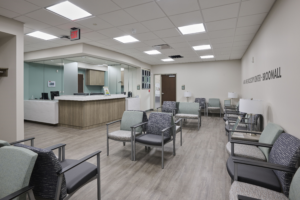Woodland Park, NJ – Step inside the Gastroenterology Diagnostics of Northern NJ and explore our state-of-the-art facility from the comfort of your home with our new 360° virtual tour. Renowned for our commitment to high-quality healthcare, we take pride in maintaining a welcoming and serene environment that ensures our patients’ peace of mind.
Take the Google 360 Tour
Get a closer look at the exceptional care we provide with our interactive 360° tour, captured by a certified Google photographer. Journey through our inviting reception area, advanced procedure rooms, and peaceful recovery spaces—all designed with patient comfort as a top priority. At Gastroenterology Diagnostics of Northern NJ, transparency is key. We believe that by offering a full view of our facility, you can feel confident and at ease even before stepping through our doors. This virtual tour aims to reduce any pre-visit worries and build trust by showcasing our commitment to patient care.
 Why Choose the Gastroenterology Diagnostics of Northern NJ?
Why Choose the Gastroenterology Diagnostics of Northern NJ?
- Modern, Welcoming Environment: Our facility is carefully maintained to ensure cleanliness and comfort, offering a positive experience from the moment you enter.
- Tailored, Compassionate Care: Our dedicated team is focused on providing personalized, patient-centered care to meet your individual healthcare needs.
- See Before You Arrive: Through our virtual tour and photo gallery, you can get a feel for our center before your visit, promoting confidence and informed decision-making.
At Gastroenterology Diagnostics of Northern NJ, we blend top-tier medical care with a calm, comfortable atmosphere designed to ease your experience. We invite you to take the tour and discover how we’re committed to your well-being at every step.
 Why Choose the May Street Surgi Center?
Why Choose the May Street Surgi Center? At Endo-Surgi Center of Union, we blend unparalleled medical care with an environment that prioritizes your comfort and peace of mind. We invite you to discover the difference at our state-of-the-art facility.
At Endo-Surgi Center of Union, we blend unparalleled medical care with an environment that prioritizes your comfort and peace of mind. We invite you to discover the difference at our state-of-the-art facility. Designed with patient comfort in mind, our endoscopy center with four procedure rooms will host a wide variety of amenities specifically designed to make your future visit a pleasant one.
Designed with patient comfort in mind, our endoscopy center with four procedure rooms will host a wide variety of amenities specifically designed to make your future visit a pleasant one.